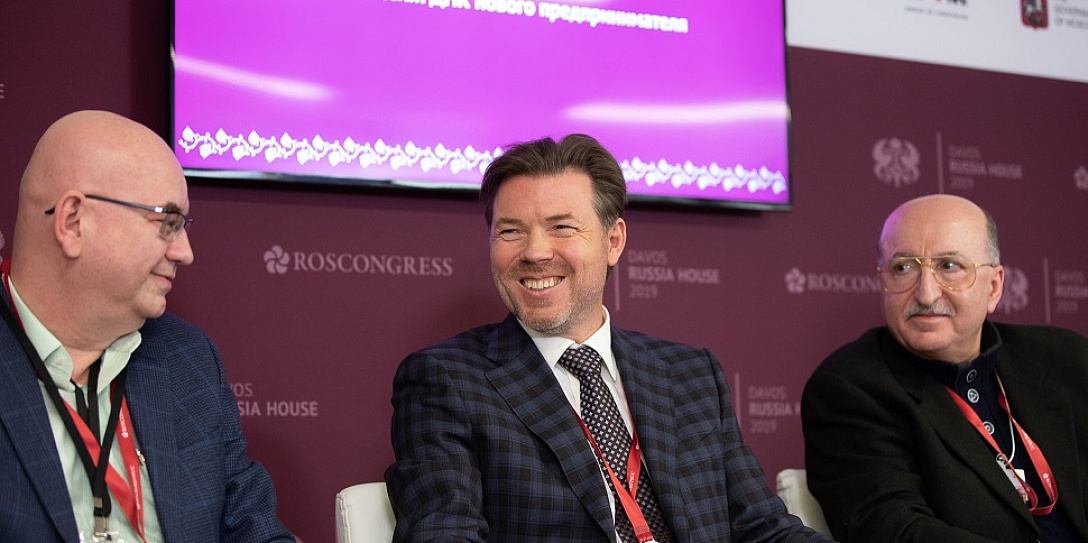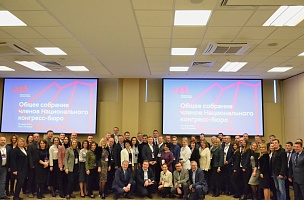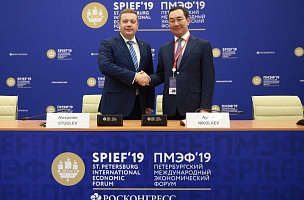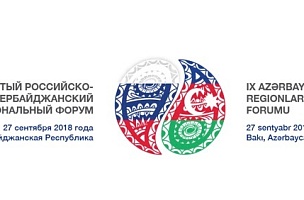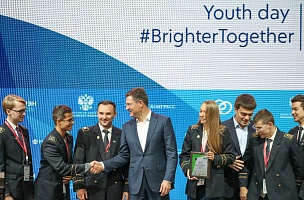Under current conditions entrepreneurship is the cornerstone for developing business environment and economy growth for any country.
«The Russians have proven themselves to be among the best entrepreneurs in the world. There’s no lack of ambition or lack of creativity. So I think it’s an area that’s going to be a more and more important driver of the Russian economy,» John Boynton, Non-executive Chairman of the Board of Directors, Yandex.
«Only 20% of our GDP goes to small and medium business. In the most innovative economies — such as Finland, Italy, or France — this share is 60%. In those markets, entrepreneurship is commercialized through innovative ideas that get to consumers,» Alexander Ivlev, Country Managing Partner for Russia and CIS, EY.
«Business people are the main bread winners that replenish our country’s budget,» David Iakobachvili, President, Orion Heritage.
«Entrepreneurial environment is important for business, but the most crucial thing is the entrepreneurial spirit that allows business people to make the right decisions, to look for the rights niches, to enter markets with the right products and to cooperate with their partners,» Alexander Ivlev, Country Managing Partner for Russia and CIS, EY.
«We can’t treat entrepreneurship as a structure that can only be developed through the government. Entrepreneurship goes from the bottom up,» Alexander Ivlev, Country Managing Partner for Russia and CIS, EY.
The health of the society is sensible to the presence of a developed entrepreneurial environment.
«Entrepreneurship is frequently associated with business. I believe that entrepreneurship is much broader than just business in terms of its span or outreach. Business is earning money. The Russian word for entrepreneurship derives from ‘enterprise’. Entrepreneurship is sometimes not about earning money. It can be social entrepreneurship, when people open museums with their own money. It’s entrepreneurship as well. People do it for a reason,» Stanislav Kostyashkin, Chief Executive Officer, Continent Express.
«Being an entrepreneur is a calling. You can’t learn it. It’s an art of being a person who can fall, rise and move forward,» Alexander Ivlev, Country Managing Partner for Russia and CIS, EY.
«An entrepreneur is driven by something bigger that just earning money. It’s not a guarantee that an entrepreneurial quest will be a success,» Stanislav Kostyashkin, Chief Executive Officer, Continent Express.
«An entrepreneur is a creator. They either create something absolutely new or change something for the better,» Stanislav Kostyashkin, Chief Executive Officer, Continent Express.
«A modern entrepreneur — at least in Russia — moved from a speculative mind towards a creative one, when they create certain values. Moreover, those values are material, inner and spiritual,» Timothy Okroev, Chief Executive Officer, Russian Translation Company.
«The most important thing an entrepreneur acquires over his path is not what he earns, but what he becomes by overcoming himself and by eradicating their dilapidated self, their egoism and rigidity. It’s very important,» Timothy Okroev, Chief Executive Officer, Russian Translation Company.
«Achievements of any entrepreneur include attracting whoever is more competent and smarter in their area of expertise. And that may lead to a breakthrough,» Timothy Okroev, Chief Executive Officer, Russian Translation Company.
Russian entrepreneurs are competitive in many global markets.
«Look where we have lots of breakthroughs, where a Russian entrepreneur sets standards for the whole world. There are many breakthroughs in the areas we didn’t inherit from the Soviet Union, but rather built from scratch: telecoms — Russian communications rank among the best in the world; banking sector — we do have breakthrough financial technologies; retail,» Nikolay Korzhenevsky, Economic Observer, Russia 24 TV Channel.
The government provides sufficient support to entrepreneurs in Russia.
«Problems exist everywhere. There’s not a single state where everything would be perfectly easy. It’s always something. That’s why I wouldn’t feel sad that it’s harder for us than for everybody else. In this situation the government helps us in the IT sector, because the existing tax system really benefits development of IT in Russia,» Stanislav Kostyashkin, Chief Executive Officer, Continent Express.
Problems
Marginalization of Russia and Russian business abroad creates unbiassed barriers for its development.
«One of the most important changes of the last 5 years is marginalization — if not stigmatizing — of everything related to Russia,» Nikolay Korzhenevsky, Economic Observer, Russia 24 TV Channel.
«As long as there’s a risk of negative perception in the West, it’s going to make it very hard for Russian businesses to extend out of the borders. We need to get back to a place where we had more trust,» John Boynton, Non-executive Chairman of the Board of Directors, Yandex.
«Are sanctions an obstacle? Yes, they are. Is lack of communication an obstacle? Yes, it is,» Timothy Okroev, Chief Executive Officer, Russian Translation Company.
«It’s a war of ideologies. It is what it is. It’s just wars can be different. It’s just we are used to saying that a war is when somebody gets killed. What about economic warfare? Isn’t it a war? What about a war of ideologies? Isn’t it a war?» Stanislav Kostyashkin, Chief Executive Officer, Continent Express.
Changeability of the institutional environment makes long-term planning difficult for entrepreneurs.
«We heard promises to keep existing conditions for 5 years, which was, unfortunately, never delivered. Despite the number of those promises, things change one way or another every year,» David Iakobachvili, President, Orion Heritage.
«There’s a change of sorts all the time, and it’s in the way of things,» Alexander Ivlev, Country Managing Partner for Russia and CIS, EY.
Russia has a long-lasting problem of commercializing new ideas and technology.
«Generally we have a massive problem. And it concerns medium and small entrepreneurship. It’s about inability to commercialize one’s technology. I believe that in the next 5–10 years we’ll have invest our efforts in learning it,» Timothy Okroev, Chief Executive Officer, Russian Translation Company.
«As Loren Graham put it during the St. Petersburg Forum (SPIEF 2016), a light bulb, a laser — there’s so much that was invented in Russia long before it appeared in the West, but we were unbale to commercialize and promote it, if we use marketing terms,» Timothy Okroev, Chief Executive Officer, Russian Translation Company.
Solutions
Young people’s entrepreneurial activity is the main factor for the development of entrepreneurship.
«Entrepreneurship’s share in Russia’s GDP is very low. There are not enough young people willing to become entrepreneurs and to start their own business,» Nikolay Korzhenevsky, Economic Observer, Russia 24 TV Channel.
«Today’s young people are so vibrant, they have so many ideas. They work and think in a different fashion, and they see a different future for Russia and the whole world,» David Iakobachvili, President, Orion Heritage.
«We need to work with young people more,» Alexander Ivlev, Country Managing Partner for Russia and CIS, EY.
«There’s just 2% [of young people] willing to become business people. Breaking this trend is easy. You need to make it popular,» David Iakobachvili, President, Orion Heritage.
«I think it takes time to change. These are things that are deeply imbedded into cultures. I think we need to continue to tell positive stories, and let’s make heroes out of entrepreneurs. That will inspire others to proceed that path,» John Boynton, Non-executive Chairman of the Board of Directors, Yandex.
First of all, developing entrepreneurship in markets that are new and underdeveloped in Russia.
«The quality starts with the entrepreneur’s DNA. Success starts when you find something new, something vacant. [...] An entrepreneur can find those niches that sort of wind up the economy by adding value. Best cases are the ones with vacant niches,» Stanislav Kostyashkin, Chief Executive Officer, Continent Express.
«Let’s take Continent Express [that was created 22 years ago]. Why is it a great example of blue ocean? I brought corporate travel management to Russia, which was a completely new industry. It didn’t exist here before. We created jobs, came up with a model and naturally took a global best practice — mainly the English or the West European model. We customized it to fit the Russian reality and created the first Russian version. Now this industry in Russia has dozens of thousands of jobs. It’s white collars — well-paid employees, which means our high taxes don’t just go to Moscow and St. Petersburg, but other regions as well. That’s the benefit, the value that we bring. Through our work we optimize corporate governance and travel budgets in largest corporations, as well as their business processes. Years of our performance saved dozens of millions of dollars for a number of corporations. This money was channelled towards other investment with higher efficiency,» Stanislav Kostyashkin, Chief Executive Officer, Continent Express.
«Our teams has found a new area — admintech. We’ve started our own IT company, and we’re creating technology for expanding administrative processes that we manage. This is something completely new. There’s nothing of this kind even abroad. We do it together with the largest global companies here in Russia,» Stanislav Kostyashkin, Chief Executive Officer, Continent Express.
«We’ve created a 5.0 generation travel management company. And I can already see what generation 6.0 will be like. We need our technology to reach the stage when we are certified in cyber security for that enormous array of information we work in. We keep looking what is next, where we are going, what we can offer and what is new,» Stanislav Kostyashkin, Chief Executive Officer, Continent Express.
Entrepreneurship should be used in high-tech sector of Russia’s economy.
«One sector where Russia has particular strength is the technology sector. Russia is regarded around the world as one of top producers of the greatest math and engineering minds. Success breeds success,» John Boynton, Non-executive Chairman of the Board of Directors, Yandex.
Free competition in the market is the fastest and the most proper way to ensure development of entrepreneurship.
«We discussed how we can help our companies in tapping into global markets. In reality, we just need to play by market rules and within competition environment through using global best practices that exist today,» Alexander Ivlev, Country Managing Partner for Russia and CIS, EY.
Transparency of business practices is a prerequisite for success in global markets.
«A lot of it is inborn in terms of the ambition. But what needs to change and continues to evolve is solid business practices and corporate governance in particular,» John Boynton, Non-executive Chairman of the Board of Directors, Yandex.
«When we started Yandex back in 2000, we added good business practices in the DNA of the company back at the time. And I think it’s one of the critical factors that’s enabled the company to grow. So we need to educate these up and coming entrepreneurs on the importance of incorporating good governance practices into their businesses,» John Boynton, Non-executive Chairman of the Board of Directors, Yandex.
«I think that governance plays an important role in the businesses,» John Boynton, Non-executive Chairman of the Board of Directors, Yandex.
«If Russian entrepreneurs want the opportunity to sell their companies to bigger companies or go public in the West. Now 80–90 Russian companies are listed at the foreign exchange, roughly 90% are listed in London and New York. So accessing those markets doesn’t happen without good governance,» John Boynton, Non-executive Chairman of the Board of Directors, Yandex.
Entrepreneurship can play the role of public diplomacy in solving politics-related issues.
«We need to be as loud as we can about entrepreneurial successes, about it being the least controversial topic for discussion with our vis-à-vis, with our foreign partners. It’s a great platform,» Timothy Okroev, Chief Executive Officer, Russian Translation Company.
«Everyone offered a solution for what we need to do. We need to clench our teeth, endure it all and just keep going, just like we are going to Davos now [...]. Nobody can ever beat it, it’s the soft power, it’s people’s diplomacy, it needs to continue. We need to fill the void that emerged on the international level,» Stanislav Kostyashkin, Chief Executive Officer, Continent Express.
Information may be used with a mandatory link to the Information and Analytical System of the Roscongress Foundation.


